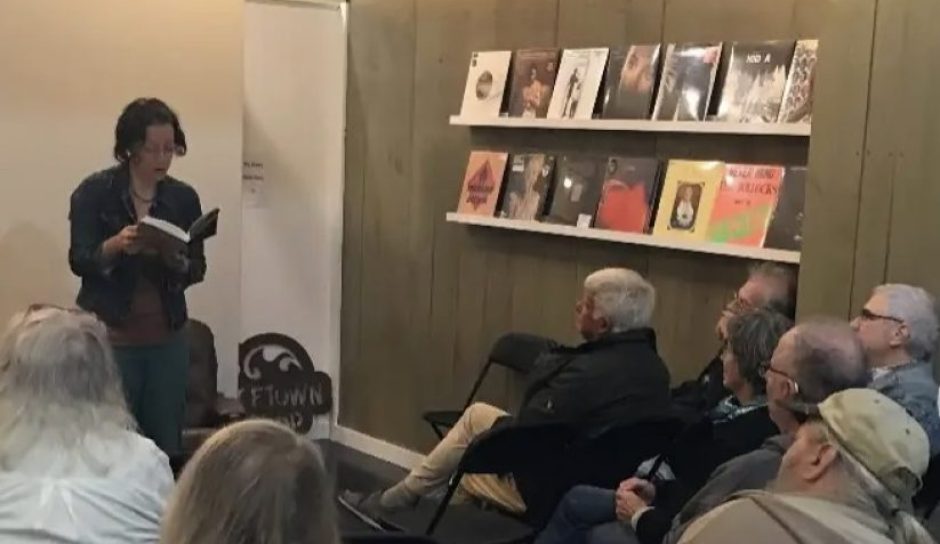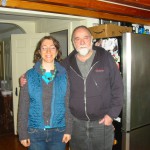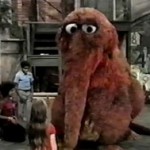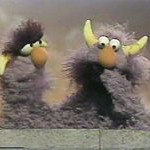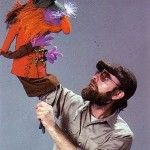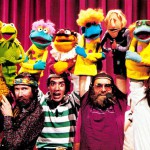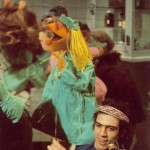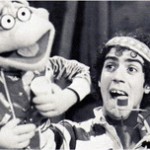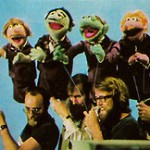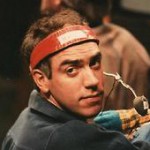If there were a Mount Rushmore of main Muppet performers, it would feature Jerry Nelson’s face. Best known as the Count, Nelson has performed countless roles in his nearly fifty years as a puppeteer on Sesame Street, The Muppet Show and Fraggle Rock. Nelson and Richard Hunt were co-workers and friends for over twenty years.
I had the privilege of sitting down with Nelson in his lovely Cape Cod home for a two-part interview. Here’s part one, in which Nelson talks about working and playing with Hunt on Sesame Street and The Muppet Show, the zen of puppetry, and much more!
Jessica Max Stein: Tell me about the early days of working with Richard on Sesame Street, what he was like when he first started in 1970.
Jerry Nelson: Richard was 18 or 19. He was like a puppy. He was really bouncy and eager – overeager, really. So we had to sit on him a lot. “Calm down, Richard, calm down.”
JMS: So you and Richard did Snuffleupagus together?
JN: Yeah, we did. That was early on. ’73, maybe ’72. It wasn’t much fun for Richard. It was hot in there. Richard was good and gave him good movement. We’d work outside of the costume for dance things, because there were several times when he would dance.
They used to hang him from up in the ceiling, because there wasn’t a whole lot of studio space. One time I remember, we had this bit. Snuffleupagus loved cabbages, and so Big Bird got all these cabbages for him. And he ate all these cabbages, just kept eating these cabbages, and we’d just put them in the back where the stomach is. We finished the bit, we got out – there was a seam they would open in the side so we could get out – and then they hung him up. We didn’t use him for quite a while. When we came back, the cabbages had been sitting in there for probably a few weeks. It was pretty ripe.
It wasn’t fun for either one of us, but I was close to the mouth, so I did get a little bit of air in there. They were good about it; if we were in it for a long time, they would open up the side, and blow a fan in.
Richard was very spontaneous. We had a lot of fun doing Two-Headed Monster. We had been pals for a while, and so we just really had a sense of where we were going. Usually we would talk over a bit before we did it, just outline it, and then we’d just play with it.
JMS: I heard that the Two-Headed Monster came about because you guys were just playing around.
JN: We were goofing on the set, and there happened to be a couple of writers in the studio, and they came over and asked us what we were doing, and we explained it to them, and it became a character.
JMS: Sometimes it’s hard, when watching a sketch, to tease out how much of what we’re seeing comes from the performer, what comes from the writer, and then of course from the puppet-maker, what is given off just by how the puppet looks.
JN: Well, it’s a combination of all of those things, obviously. We used to have to go in to record things, often before we would see the puppet, which is really difficult because you don’t know what it looks like. It would be very easy to pick a voice which would be counter to what the puppet looked like. But it is a big part of everything.
It also was a big part when Jon Stone was directing, because Jon had been a director, he had been a producer, he had been the head writer, so he covered a lot of territory. He would come in, and there might be a very long, wordy bit, and he would say, “This is way overwritten. We’re going to lose all of this, and here’s the idea, and just do it.” That would often be what we would do. Especially with Two-Headed Monster. With other things, the writers of course were brilliant and give you really good material to work with, so there’s really no need, often.
What often happens is, the puppet is right, you’re right, the words are right, and it just goes somewhere that you kind of almost – it’s not like you’re thinking about it, if you were thinking about it, it wouldn’t happen. It’s very zen, in a way. The target you’re aiming at is yourself, as in darts or pool or golf or any of those sports. It’s the same kind of thing. Because we’re watching ourselves. We’re performing for ourselves as much as anything, because we see what we’re doing [in the monitors], see how it’s gonna look.
JMS: Backwards!
JN: Well, yeah, but you tend to forget that. I forget who said it: “When you do something 320 times, it becomes muscle memory, and when you do it 3000 times it becomes a part of you.” Sort of like that, as far as working with the backward image.
But it really is a combination of everything, of everybody, because also the puppet builders and the costumers give you so much to work with, so it’s easy. Our part is easy. We just show up. [laughs] Really, all of these characters are just elements of ourselves. I think there tends to be a part of us in everything, and we see that, and then we expand that, blow it out bigger than it actually exists in us.
JMS: So would you say there are some characters that feel more like you than others?
JN: Well, I would say probably Floyd and the Count, and there are a couple of others that are probably more like elements of me than others. I don’t think that was necessarily so at the beginning with the Count.
I think in regards to anything we would do, often it was a struggle to find it. Kevin [Clash] probably told you the story about how Richard just threw him the Elmo puppet, said, “Here, you do this, I don’t want to do it.” Richard was very generous. I have a funny story about that.
Richard went somewhere with some friends for dinner. They got there a little late; the restaurant wasn’t closed, the kitchen was still open, but not for long. And so they ordered. There was a group of them, so it was kind of unruly. They got the order in, and they ordered drinks, and the waiter was slow. Eventually the steaks came, and half of them were not right for some reason or another. Richard had been complaining about this waiter every time there was an episode. Finally, he said, “That’s it. Not a penny over 15 percent!” [laughs]
Richard was generous. He’d get something, and he’d just give it to somebody. He took his family to Hawaii, and he bought all the women black pearls. That was just his nature. He had a big heart, Richard did.
JMS: Tell me about filming The Muppet Show. Did the performers live in London?
JN: The first year [1976], Richard and I both took rooms in a hotel called the Portobello Hotel [in London]. It was a hotel where a lot of show people would stay. It does not still exist in the same guise as it was then. Then it was a lot of creative people.
The rooms were tiny. I stayed in rooms there that if you wanted to watch television, the television was often just over the bed, on an arm or something. You couldn’t have more than another person in there. If another person was in there, one of them had to be on the bed. But they weren’t all like that. We had some rooms that were a little better than that.
We had some funny times in there. There was a concierge, or a desk guy, that Richard had conversations with. The concierge was sitting with some people in a lounge area back behind the reception area. He said to Richard, “I want you to meet some people,” and it was the Sex Pistols. Richard, in his genuine way, said, “Oh, what do you guys play?” and one of them said, “Hard-drivin’, kick-ass, f-ckin’ punk rock and roll, like it or not.” And Richard said, [pauses] “Oh.” [laughs] Sort of typical of the Sex Pistols, I guess.
Yeah, a lot of people stayed in that hotel. Patti Smith stayed there, Loudon Wainwright the Third, a couple of science fiction writers. After that we all got apartments in various parts of town. And then he lived in Hampstead Heath, the Vale of Health.
JMS: So that’s about ’80 and ’81.
JN: Yes. He stayed an extra year, because he worked on The Dark Crystal, I didn’t.
As a matter of fact, I was coming back and I wanted to rent his house here [on Cape Cod]. It’s funny when I think about it, because when he was buying that house, in ’79, he said, “They’re selling these houses, you wanna buy one?” I said, “Richard, I’m not going to buy a house in a place I’ve never been!” He said, “But it’s really reasonable, you should buy one. I’m buying the one that I stayed in when I grew up.”
That’s where he is in that picture. That was his favorite place to sit and read, and look out over the Cape Cod Bay. Provincetown is right over there. That was the house he bought. And I didn’t, fool that I am.
JMS: To go back to the Muppet years, everyone has these amazing stories about Richard’s parties.
JN: Richard knew how to throw a party. One I remember specifically was a champagne party. One of the guys at the studio knew where to get a good price on vintage Dom Perignon, which at the time was Richard’s favorite. So he had a party, and invited all the cast of the show, the puppet builders and the costumers. This would have been ’77. He had a couple of cases of Dom Perignon. It was a good party.
Another one he had at the Vale of Health. We had gone to see Yes together. We went backstage and met the band. Rick [Wakeman, the keyboardist] told us how at some concerts, he would take a puppet of Rowlf, and he would duck down and play the organ like Rowlf was doing it. Richard and Steve Howe [the guitarist] became friends, and Steve came to that apartment with his wife, and a couple other people. That was a bigger party, because Richard knew a lot more people then, London people.
We did some fun moving around in London, met some neat people. We also went to a Little Feat concert, with Tower of Power brass. That was hot. There was always a lot of stuff happening in London, a lot of stuff to do.
JMS: What did Richard like to eat? You talked about the champagne a little bit, but somebody who lived so joyfully and enjoyably must have loved food, too.
JN: Yeah, he liked good food. On one of our breaks, we had a break from The Muppet Show, and somebody knew somebody at the studio who had a houseboat in Beaulieu sur Mer, which is in the Cote D’Azur of France. So Richard and I took it for a week.
We went to a restaurant in a town back towards Nice. It was a fantastic place, it looked like a big mansion. It was a three-star restaurant. Richard and I went, and we had a bottle of wine, and ordered entrees. The entrees came, and we had them, and they were so good, we had another entree each. They weren’t big American portions. They’re sane in their portions. But it was so good. I think first we had stuffed sea bass, and then we had some steak, probably filet mignon. And another bottle of very expensive wine. It was really expensive, the whole meal. This would have been in the 70s, and it was like $200 for the two of us. But we were living large in those days.
I also remember another party in England. One of our designers on the Muppet Show, Malcolm Stone, he played Old Boys Rugby. So he asked Richard and I if we would do a puppet thing. We did Scooter and Pops, and he gave us all the skinny on everybody, like who was having an affair. So the puppets knew everything about all these guys, and so we took the mickey out of all of them. And then there was what in England they call a big pissup. It was dinner but it was mostly drinking.
During that party, my daughter [who was in America] had a bad episode. Christine had cystic fibrosis and was in the hospital a lot. But she had a bad episode and started bleeding, internal bleeding in the lungs, while we were at this party. So we drove back, and Richard drove me out to my house so I could pack a bag, and then we went back to his place. While I was there I made a reservation on the SST Concorde for that morning. We went back to his place and went out in the park and just talked, sat and talked, until it was time to go to the plane.
JMS: I’m surprised you made the plane. I hear so many stories about Richard being late.
JN: Oh, I’ve got stories. Usually, when we were working, it was uncanny, he would come in just [snaps] at the time. It was hardly ever, “Where’s Richard?” He would come in just in time to rehearse the bit and do it. Once in a while he’d come in and wouldn’t rehearse the bit and still do it. Yeah, he was phenomenally late.
I could tell you more stories than you’d want to hear about Richard being late. As a matter of fact, this has to do with the SST, too. Richard and I were supposed to catch the SST from JFK, going back to London.
This had happened a lot. Richard would say, “I’ll pick you up at such-and-such,” and he was always late. And I was always having to run for planes at the last minute. This time I said, “Richard, I’m going to get myself to the airport. I’ll meet you there, okay?” So he said, “All right, okay.” So it came time, and I’m looking for Richard, no Richard. Boarding the plane, boarded the plane, still at the gate, waiting and waiting, thinking he’s going to run in at the last minute – he missed the flight.
He missed the flight, and this is what burned him afterwards. We had flown over once before, and had talked to the stewardess, and she was interested in what we did. So we had invited her to bring some friends to the studio to watch the taping. She came with three of her pals, all stewardesses, and they watched the show.
So I get on this plane – Richard missed it – and it’s this stewardess. She recognized me, and said, “Oh, it’s good to see you. Thank you again so much, we had a great time, the girls are still talking about it.” Then she says, “Would you like to see the cockpit?” I said, “Sure!” She said, “After we get up in the air, after we get out to sea. The pilot is a friend and he loves the Muppets.”
So I’m sitting there doing the New York Times crossword puzzle, and she comes right back, and she says, “Come now, come now, they said you can sit there for the takeoff.” So I get to sit in the cockpit. There were four seats: there was a pilot, co-pilot, navigator, and an empty seat.
So I’m sitting there, strapped in, and they took off, and after we got out over the sea at Mach 2, he said, “Well, you might as well go back to your seat and have dinner, it doesn’t get any more exciting that than that!” I don’t think that helped Richard be on time in subsequent traveling.
JMS: Any more Muppet Show memories of Richard?
JN: On the second year, when we were going back to England to do the second season of the Muppet Show, we all went back on the QE2. It was Bernie Brillstein, Jerry Juhl and his wife, Jim [Henson] and Jane [Henson], and Frank Oz, and Joe Bailey, who was another writer, and Richard and I. Joe and I hung out together. There wasn’t much to do for us on the boat. We’d get dressed in our tuxes for dinner, go to dinner, and then find a nice bar somewhere, stand around and look elegant with a glass of scotch.
But Richard, on the other hand, Richard got to know everybody on the ship, like down below decks. He went to all the bars – they even had a gay bar. He went back into the bowels of the ship, where no passenger has probably ever been to before. That’s just how Richard was – so open and magnanimous, people were just drawn to him. He was just so friendly.
And yet he kept that kind of innocence. Guileless is a good word. So, on that trip, he knew that boat inside and out by the time that trip was finished. That’s who Richard was.
Here’s Part Two of my interview with Jerry Nelson, in which he talks about working on Fraggle Rock, losing his daughter Christine, the early days of performing with Jim Henson, and more!
